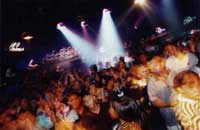
contact the culprit:
acid42@yahoo.com |
 SCENE
BUT NOT HEARD SCENE
BUT NOT HEARD
The Local Party Scene Thrives... But How?
By Lianne Soncuya (another pseudonym of mine)
printed in FLY magazine: Dec 1998
Two years ago, I was with a small promo/design agency. We had a tape recorder
in one corner and every time I'd start playing my music, I was always
asked, "What is that?" I would explain using words like techno
or trip hop. And they'd blankly ask: "How'd you hear about this music?
Do you just guess when you buy it?" I would tell them I read magazines
and watched music videos on cable. And they'd shuffle off, back to their
mushy ballads. Then just a month ago, I was playing Photek at my office
computer when one of my musically clueless officemates comes up to me
and asks, "Is that drum'n'bass?" I nod in surprise. She says,
"So that's what it sounds like. Well, just trying to keep up-to-date."
That my officemates now recognize words like drum'n'bass and appear at
garage music events, shows that times are really changing. Warehouse parties
and the idea of the DJ as entertainer are no longer alien concepts. And
whether you love or hate it, the club scene is alive and maturing with
organizers like Groove Nation, Lucky Strike and Bigstar Entertainment
importing high caliber DJs to fuel the parties. Global superstars like
Goldie and Ken Ishii and top crowd drawers such as Laurent Garnier, Derrick
Carter and Juan Atkins have all spun vinyl magic on our shores and been
surprised at the sheer number of people who come to their gigs. Slowly
but steadily, we're catching up with the rest of the world.
Which brings up a curious question. How do people know about the music
when there's hardly any support from the mass media? Radio stations don't
play intelligent dance music--- apart from a unique program like "Groove
Nation: After Hours" on 99.5RT (every Monday from 10:30 p.m. to 12
a.m.) Newspapers rarely cover the scene, apart from what underground fashions
are worn to these shindigs. Any magazines covering the beat? Well, there's
fly and a handful of zines. Any TV programs apart from the youth-oriented
magazine shows like Vibestation and Trend TV? Dream on. And what about
stores selling the music? Big names like the Chemical Brothers can now
be found on shelves, but what if I want to hear what Chez Damier's single
"Close" sounds like so I get a preview before the party? Dream
on.
Nevertheless, despite not hearing the music on airwaves, hordes of partygoers
swarm to the events hungry for the new sounds. And not just the (supposedly)
informed elite. You get tattooed skateboarders, and rowdy hip hop boys
in sandos and knapsacks, right alongside the elegant and the fashionable
with their upturned noses and velvet fabrics. Everyone occasionally singing
along to the tracks.
If all this is happening without major media and retail support, it shows
several things: (1) that the people are educating themselves. They're
gobbling up the foreign magazines, downloading audio files over the 'Net,
asking relatives abroad to send home CDs, scouring record shelves for
the odd import, watching cable TV, and continually listening for the new
stuff local DJs throw into their mix. And (2) that there is a small but
devoted following voracious for new music--- the kind that local labels
will hesitate to release because they won't move as many copies of a Future
Sound of London as they will an April Boy Regino.
Can you imagine then, what our party and music scene would be like if
we could get our hands on the music? What bliss it would be to have record
stores appeasing not only mainstream but also eclectic, underground tastes.
Definitely, local shops like Odyssey and Radio City replete with their
army of ignorant salesladies, will never be able to keep up with non-mainstream
material. Music One was on the right track, but never seemed to live up
to its hype--- even there, the phrase "out of stock" is a favorite.
Tower Records has been set to open three floors in Glorietta since August,
but construction delays have moved their opening to this December so it's
too early to tell.
It really is all a process of education. When DJs play new records, they
turn the audience on to the new sound, thereby educating the people about
what the DJ feels is a good track. The key to the process is exposure
to the music. Part of it comes from going to the clubs and absorbing the
vibe, but the other part comes from having a wide array of music to choose
from. After all, how can musical taste be elevated when what's available
is trash?
BACK TO TOP
|

 SCENE
BUT NOT HEARD
SCENE
BUT NOT HEARD